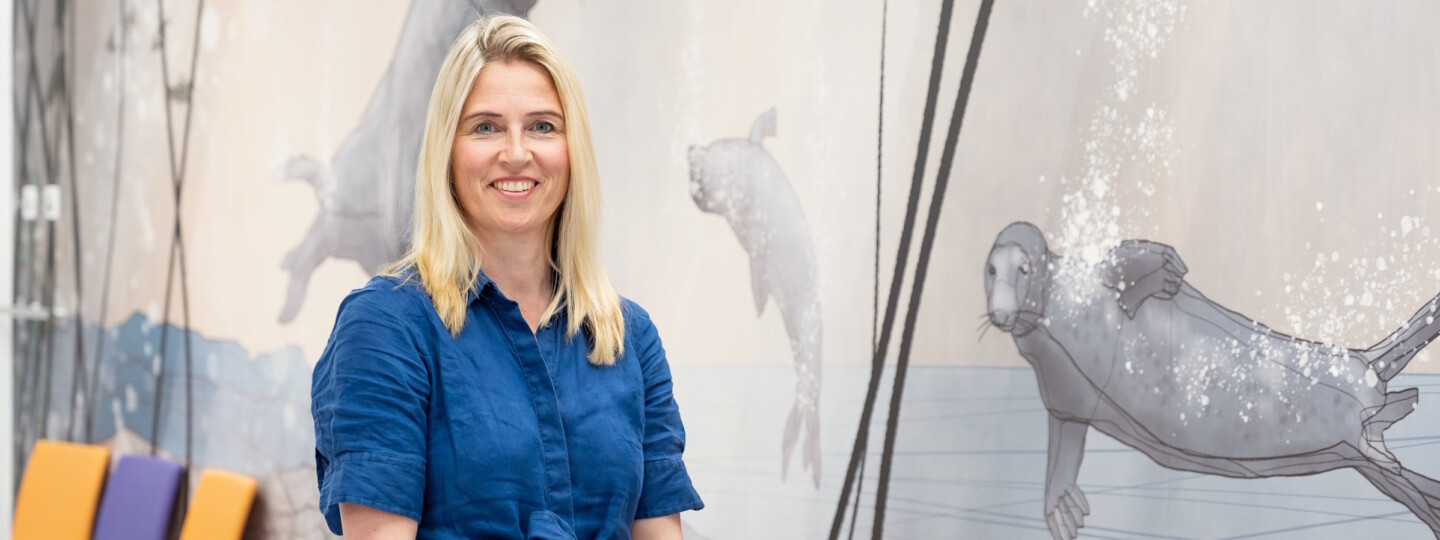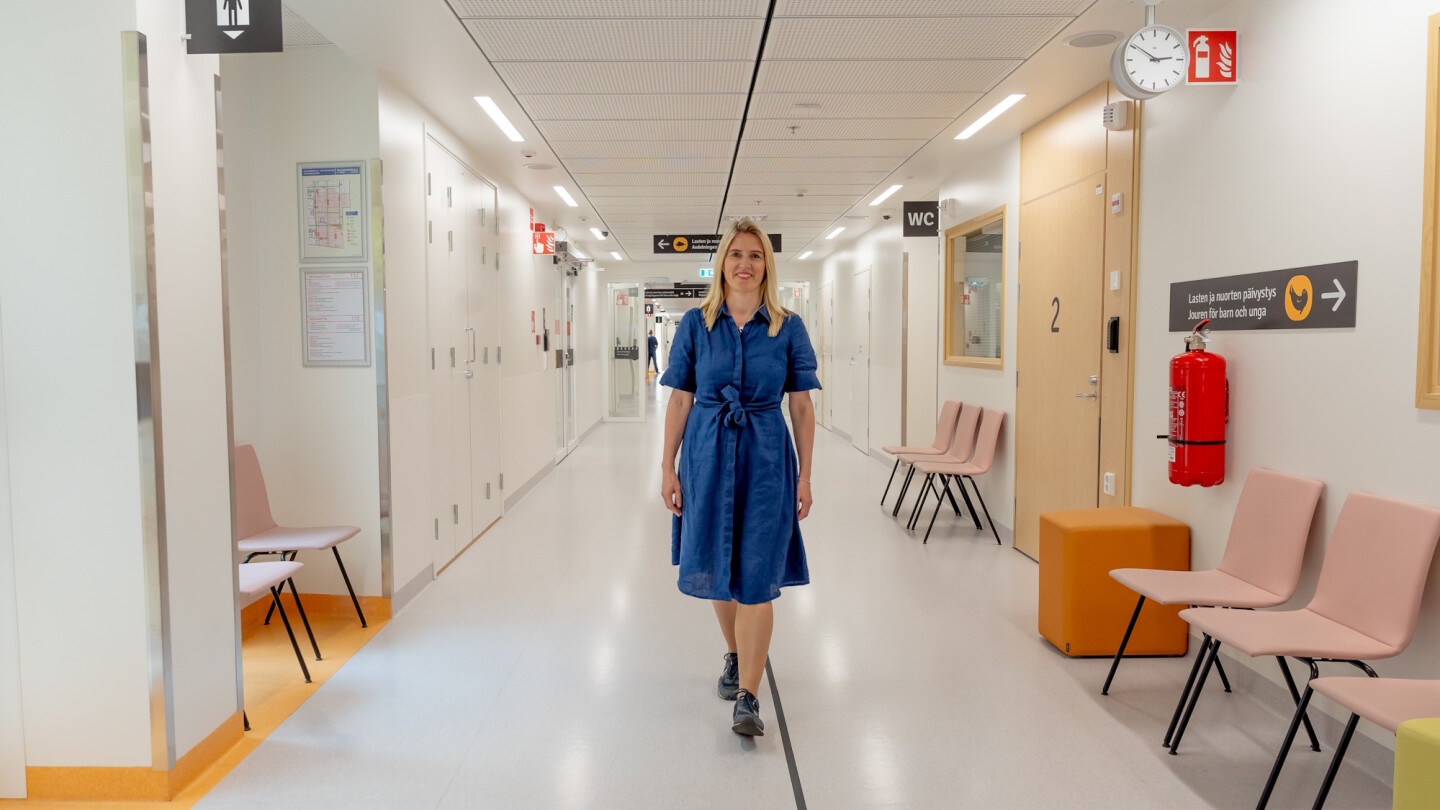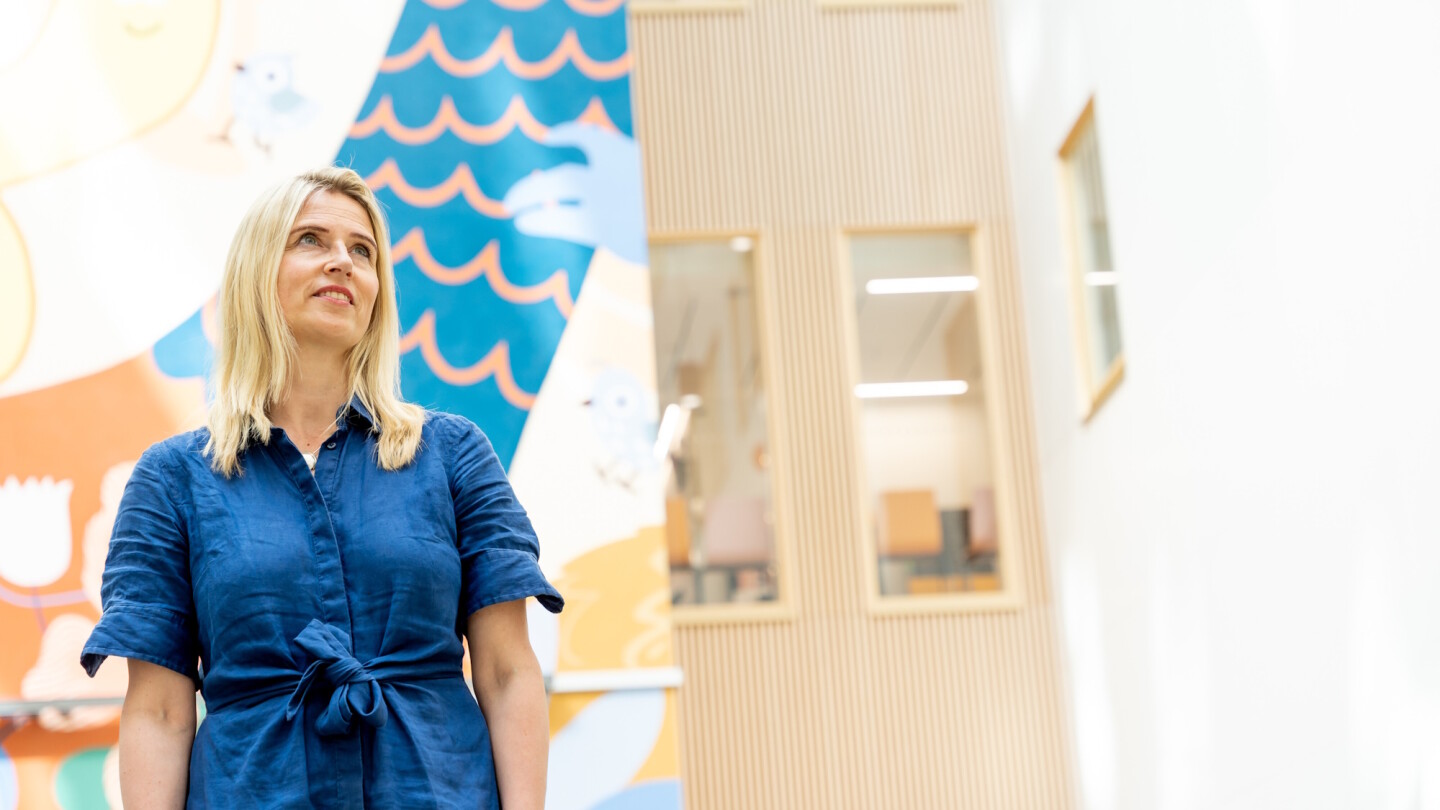A summer job at church children’s camps changed the life of the upper secondary school student. Working with children sparked a desire to help and understand vulnerable children and young people. This eventually led Riikka Korja to become a professor of developmental psychology at the University of Turku. Her passion is to help not only the vulnerable, but also early career researchers and students.
Professor of Psychology Riikka Korja arrives to the Lighthouse hospital of Turku University Hospital. The place is familiar to her, even though she has recently shifted the focus of her research from very premature babies, born at or before 32 weeks of gestation and weighing less than 1,500 grams, to slightly older children.
“Yes, all my research is rooted here,” she says.
Inspiring academic community in Turku called
The interest in developmental psychology sparked by the children’s camps led the Jyväskylä upper secondary school graduate to study psychology at the University of Helsinki. She wrote her master’s thesis under the supervision of Professor Katariina Salmela-Aro, focusing on the personal goals and physical well-being of young patients with eating disorders. She collected the material for her thesis at the Lapinlahti Hospital.
“Katariina suggested that I continue with a doctoral dissertation, but at that time it was difficult to combine clinical work and a dissertation. And as I was at that point particularly interested in clinical work, I abandoned the dissertation plans and joined the child psychiatry unit of Helsinki University Central Hospital (HUS) as a child psychologist. It was there that I became interested in child development and the protective and damaging effects of family relationships.”
Another change came when her husband started his dissertation project in Turku. Korja’s professional move was made easier by the fact that she had met researcher André Sourander from Turku in the child psychiatry unit at HUS.
“Andrés’ fresh and wise thoughts about the need for reform in child psychiatry inspired me to move to Turku professionally as well,” says Korja.
"We are studying the links between children’s learning difficulties and mental health problems, and which factors in the child's long-term development and growth environment explain mental health problems and learning difficulties.”
Even though the researcher careers of Korja and Sourander have taken different paths, there is something similar in their approach to research – they are both ambitious and successful. One example of this is the Centre of Excellence in Learning Dynamics and Intervention Research (InterLearn), where Korja leads one of the sub-studies.
“At InterLearn, we are studying the links between children’s learning difficulties and mental health problems, and which factors in the child's long-term development and growth environment explain mental health problems and learning difficulties.”
Korja is happy about how the unit combines the research strengths in learning at the University of Jyväskylä and mental health at the University of Turku.
“Our centre of excellence has a great objective, we have three independent but close-knit units, and the peace of mind that comes with a funding period up to 2029. On the other hand, the name itself presents a challenge: we must find something new.”
Full-time motherhood changed for research work
Let us get back to the early stages of Korja’s researcher career. When the move to Turku in the early 2000s became current, a PIPARI follow-up study had started at Turku University Hospital, following the development of almost 500 children from birth to school age. Approximately half of these children are very premature babies and half full-term control children.
“Child Psychiatrist Elina Savonlahti and Professor of Pediatrics Liisa Lehtonen suggested that I write a dissertation on the project. Since then, I have conducted multidisciplinary research linked to medicine. The absolute advantage of the University of Turku is that we are very multidisciplinary and people work closely and happily together,” notes Korja.
At PIPARI, her attention has been on the interaction and bond between premature babies and their caregivers. The same research theme continued at the University of Turku after her dissertation, but her main focus was at home with her three small children. Until her life took yet another turn: her spouse got a specialist position in Australia.
“When we left for Australia, my intention was to stay home with our children. However, being a full-time mother abroad turned out to be surprisingly difficult. By the time I had been a full-time mother for the spring, I had already submitted dozens of grant applications.”
The Emil Aaltonen Foundation awarded her a grant that enabled part-time research work at Macquire University.
“I became part of a research group studying the effects of parental psychological symptoms during pregnancy on the child's self-regulation.”
"Large and unique longitudinal data and an exceptionally multidisciplinary research approach allow us to explore the links between environmental factors and biological processes that influence child development at a whole new level.”
Korja returned to Finland in 2025. Since then, she has been working at the University of Turku in the Department of Psychology and Speech-Language Pathology and the FinnBrain project. Korja explains how joining the FinnBrain project, led by Professors Linnea Karlsson and Hasse Karlsson, has enabled her to build an independent research career and establish a research group as part of a larger project.
“FinnBrain’s large and unique longitudinal data and an exceptionally multidisciplinary research approach allow us to explore the links between environmental factors and biological processes that influence child development at a whole new level.”
Professorship provided sense of calm
Korja also sees dark clouds. Although psychology and speech-language pathology operating in the same department are popular choices for applicants, too few students go on to work more permanently in the public sector.
“While studying, students are still motivated to work in the public sector. However, the workload is often heavy and career prospects are limited. The professional specialisation of doctors takes place largely in the public sector. If psychology and speech-language pathology as subjects were also more closely linked to the wellbeing service counties, this could strengthen the career paths of psychologists and speech-language pathologists in the public sector.”
"My dream is that we could conduct good research in peace."
Another dark cloud is the nature of research funding.
“The current challenge in the scientific world is that external money is prone to be awarded to projects that promise quick results. My dream is that we could conduct good research in peace. It is difficult to find suitable funding instruments to maintain longitudinal data collections from childhood to adulthood.”
In 2019, Korja was awarded a professorship and admits to enjoying her work as a professor. She is no longer focused on herself and her CV. Instead, she can use her energy to educate and support young researchers and students.
“I get to work with smart and curious people. And the students. They are so wise, sensitive and give hope for the better. My job is to help them grow on their professional path, to find their psychological identity.”
Text: Erja Hyytiäinen
Photos: Hanna Oksanen
Translation: Saara Yli-Kauhaluoma






